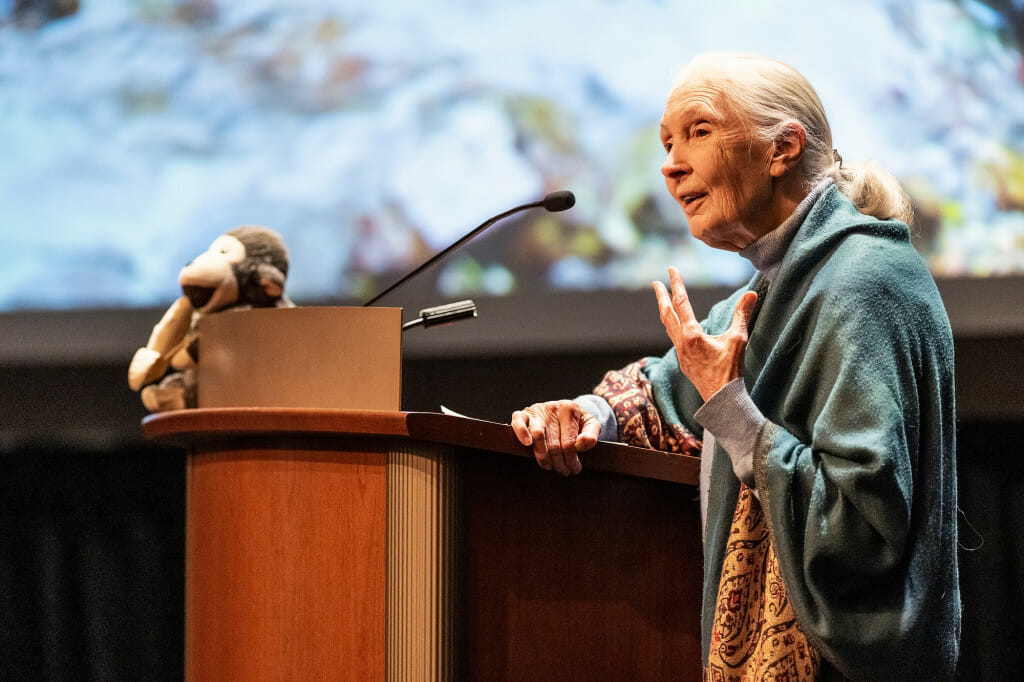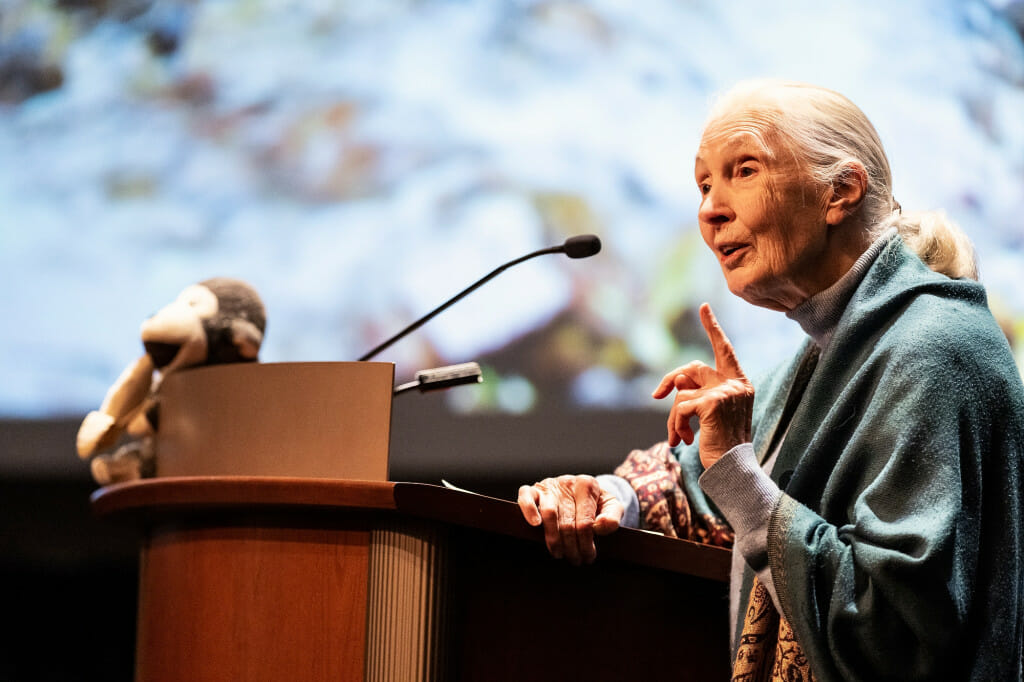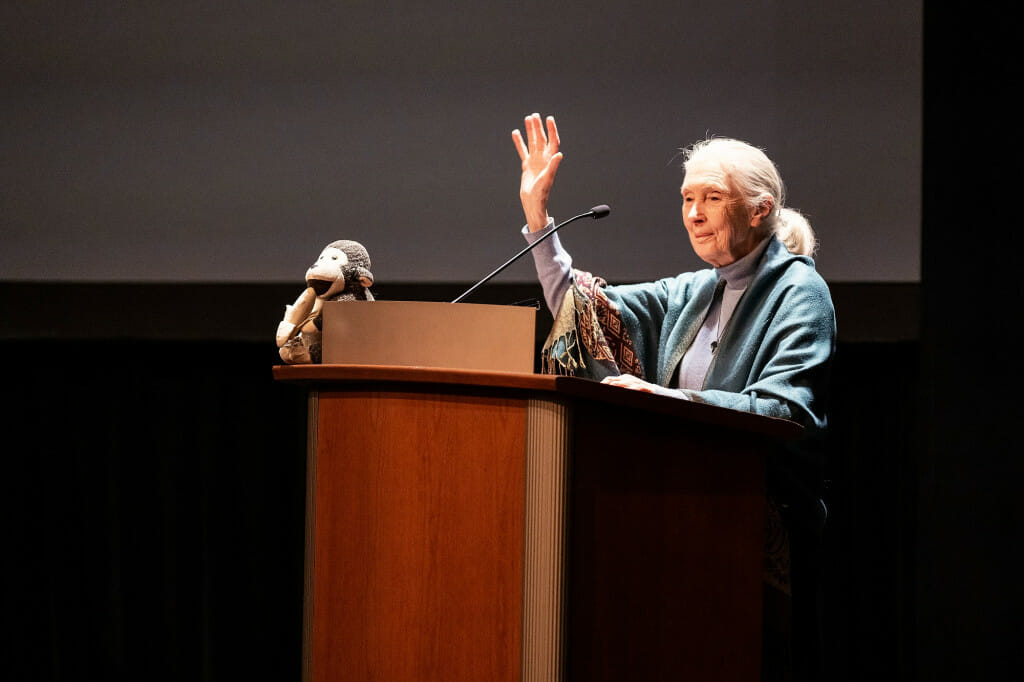There’s still time for the planet, Goodall says, if we stay hopeful
At just 23 years old — still far from becoming one of the world’s most famous scientists, but very close in age to many who packed Shannon Hall Sunday night for her event in the Wisconsin Union Directorate’s Distinguished Lecture Series — Jane Goodall shipped out for Africa on her own dime, looking for an opportunity to study animals.
What she found in wild chimpanzees wasn’t unlike human behavior. She observed them using sticks as tools (to gather termites for a snack), holding hands, kissing, cleaning, grooming and maintaining strong familial bonds.
“Males competing for dominance, standing upright, swaggering, trying to look big and dangerous, might remind you of some male politicians,” said Goodall, now almost 90 and the veteran of six decades of chimpanzee research.
Goodall, an internationally renowned ethologist and conservationist, spoke to a 1,160-person capacity crowd at Memorial Union’s Shannon Hall.
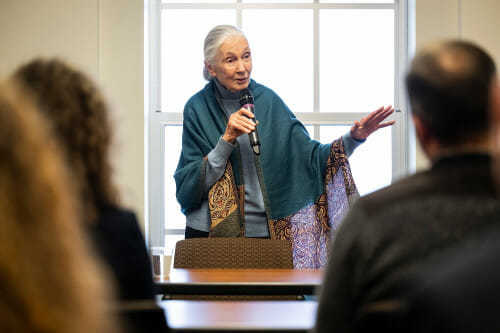
Goodall talks to a small group of students and invited guests during a private reception at the Memorial Union before her speech in Shannon Hall. Photo: Jeff Miller
It wasn’t easy for a young Goodall to get other scientists to take her findings seriously, she recalled. Her professors at the University of Cambridge, where she was working toward a doctorate in ethology, only accepted her observations on human-like animal behavior after they joined her in Africa and experienced the chimps firsthand.
“My professor said he learned more in two weeks in Africa than he had his whole career,” Goodall said.
One cannot study the natural world without noticing the impact humans have made, including climate change, according to Goodall. She experienced this with chimpanzees through direct observations of population decline, forest degradation, loss of biodiversity and more.
“When I flew over Gombe [a region in Tanzania], it used to be part of a great equatorial forest belt,” Goodall recalled. “That was in 1960. When I flew over in the late ’80s, it was a little island forest, surrounded by bare trees and bare hills, all the trees gone.”
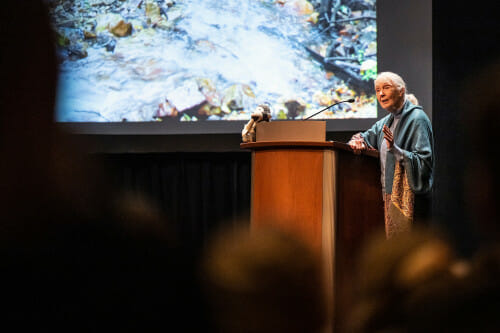
Goodall addresses the crowd. Photo: Jeff Miller
As her passion for preserving our planet and its creatures has grown, Goodall’s focus has shifted to education, awareness, and conservation efforts. She discourages dwelling on “gloom and doom,” preferring a message of hope.
“Why do people rush to my lectures all over the world? If I go to speak, the tickets are sold out in record time. It’s because I talk about hope,” she says, from “amazing people doing incredible projects, nature’s resilience, the human brain beginning to solve some of the problems that we have created, and the energy and passion of youth.”
Goodall emphasized the pressing need for both individual and societal action to avoid environmental catastrophe.
“We’ve got this window of time, but it’s closing,” she said. “We really do have to take action to change the way we live, the practices of business, and very often politics. So, it seems very grim. But if everybody does their one bit to live with a lighter ecological footprint, then, with billions of people all doing their best, that’s going to make a difference.”
That would go a long way to heal the natural habitats of chimps as well, she said, much of which have been cut down by poverty-stricken people in order to survive.
“We need to help people to find ways of living without destroying the environment,” Goodall said.
The Jane Goodall Institute puts this sentiment into practice through an approach it calls Tacare, starting conservation efforts by first consulting local communities about their needs, and then collaboratively developing solutions not only for a sustainable environment, but for sustainable economies. Tacare programs are operating successfully with more than 80 villages across six African countries.
Goodall continues to work tirelessly to spread messages of conservation and hope, and she encouraged her audience to make both key parts of their lives.
“Never forget: Every single day you make some impact on the planet,” she said, with a goal of saving the world. “Together we can, together we will, together we must.”
Learn more about Jane Goodall at janegoodall.org.
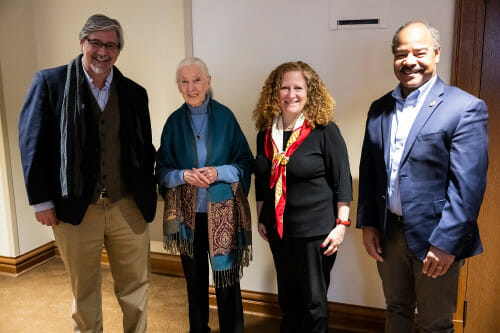
From left, Paul Robbins, dean of the Nelson Institute for Environmental Studies, Dr. Jane Goodall, Chancellor Jennifer Mnookin and Eric Wilcots, dean of the College of Letters and Science, chat following a private reception at the Memorial Union. Photo: Jeff Miller
Tags: events, Wisconsin Union

